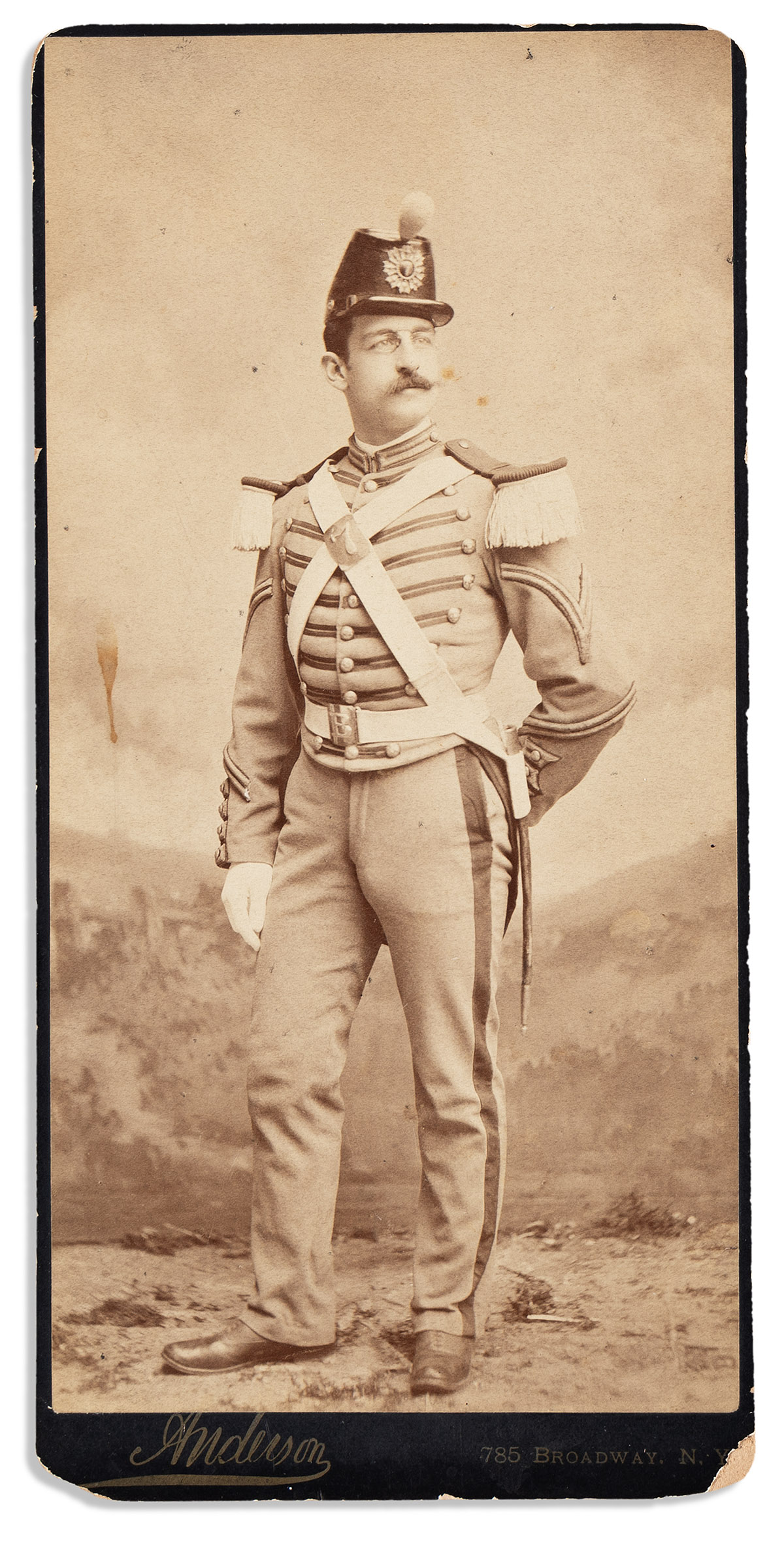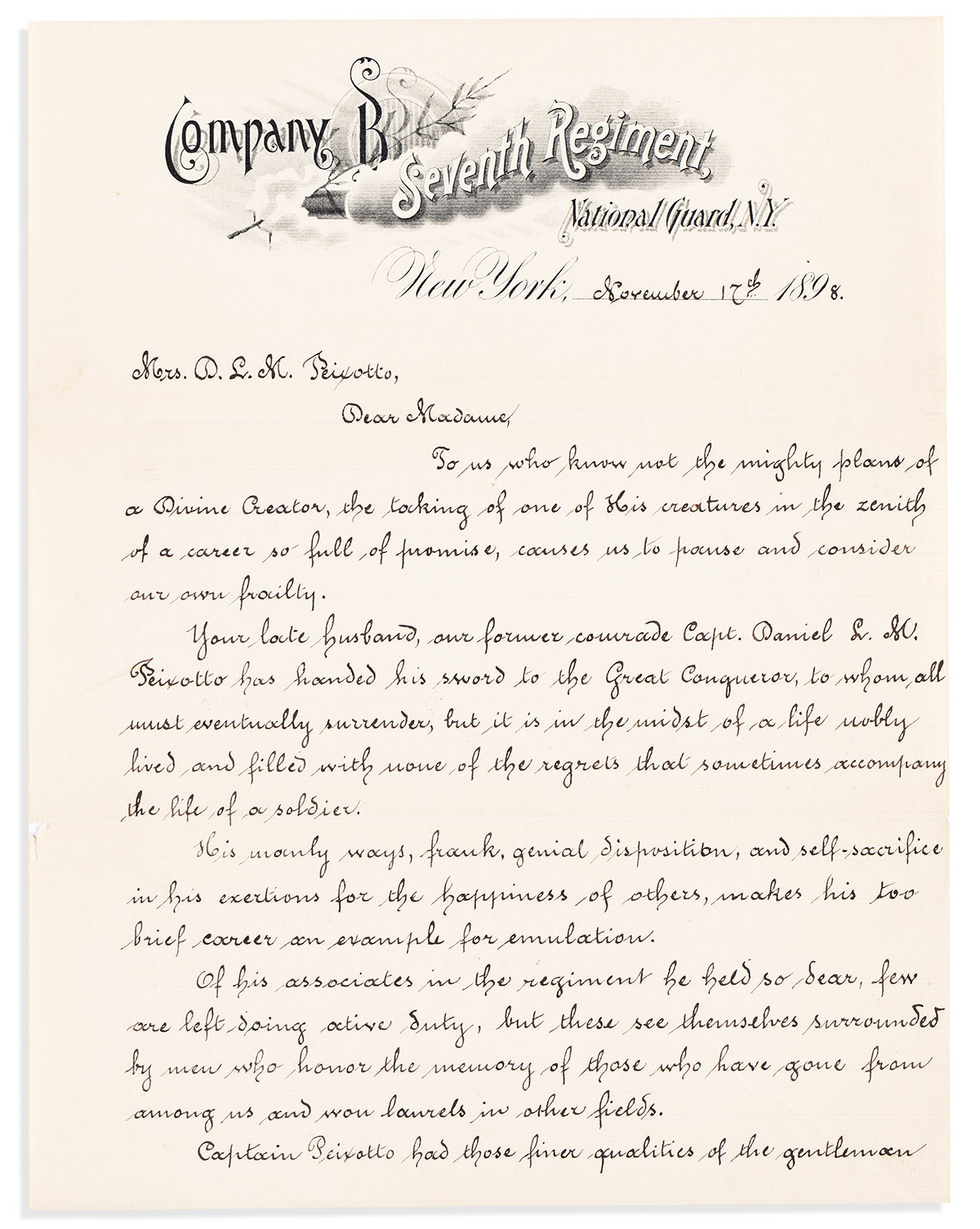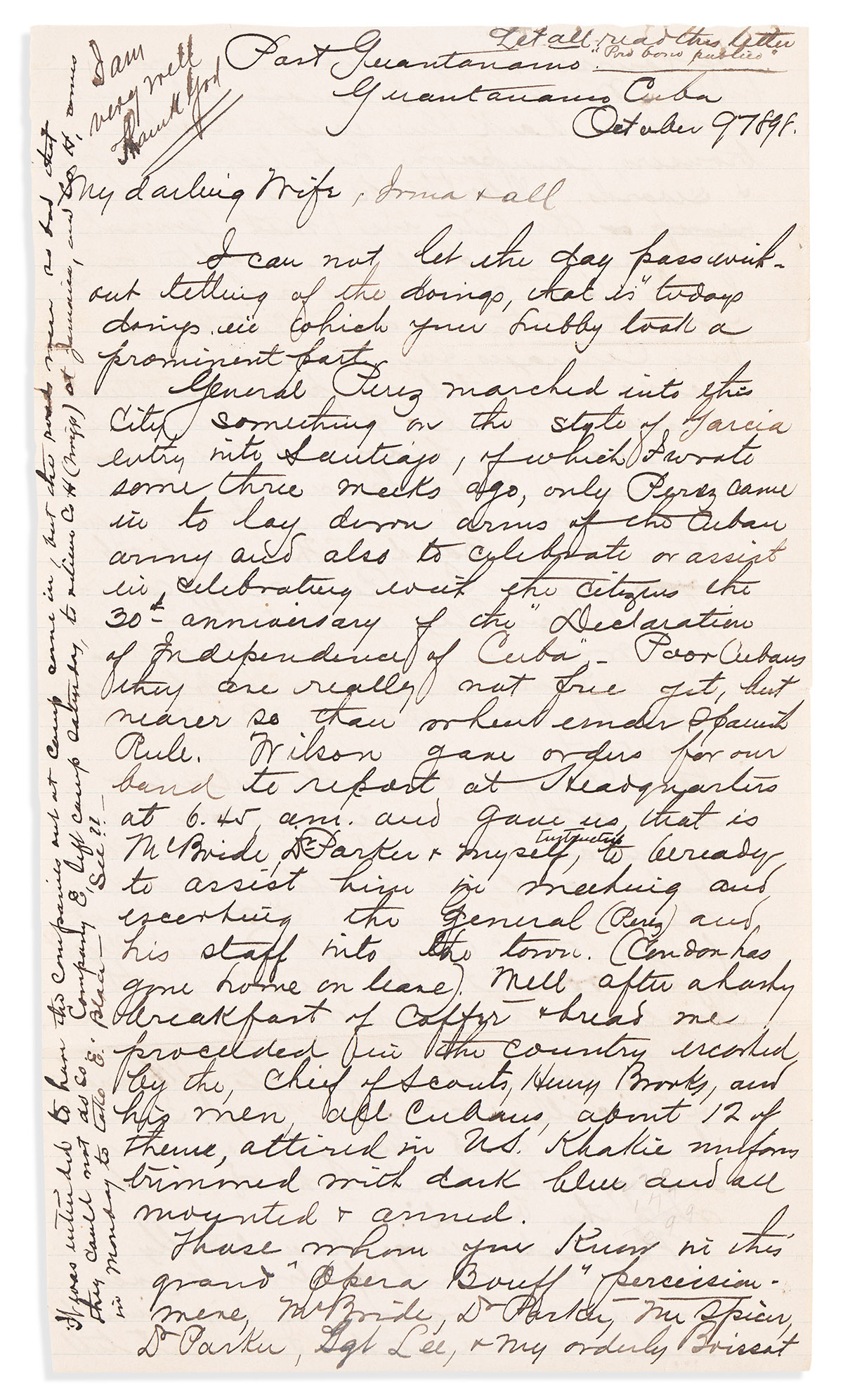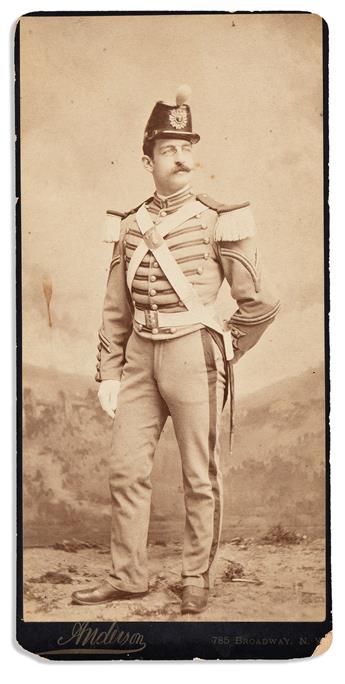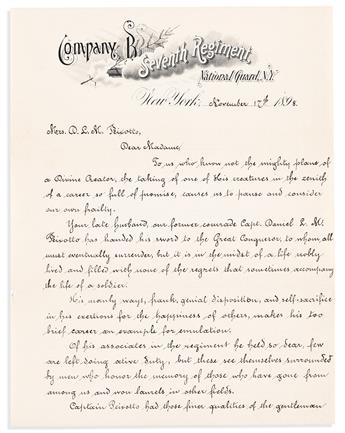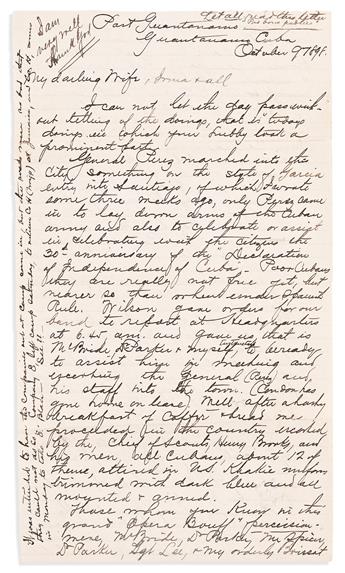Sale 2675 - Lot 162
Price Realized: $ 3,200
Price Realized: $ 4,000
?Final Price Realized includes Buyer’s Premium added to Hammer Price
Estimate: $ 3,000 - $ 4,000
(JUDAICA--SPANISH-AMERICAN WAR.) Papers of Capt. Daniel Peixotto, the first Jewish Army officer to die in the war. Approximately 45 items (23 letters by Peixotto plus other manuscripts and ephemera), sleeved in one binder; a few items with moderate wear. Guantanamo, Cuba and elsewhere, 1898
Additional Details
Daniel Levy Maduro Peixotto (1854-1898) was born into a distinguished Sephardic Jewish family in New York, where he was a pharmacist and state militia member. By 1888 he relocated to Washington and held various positions: in the census office, as an insurance agent, and in various posts in the district militia. When the Spanish-American war broke out, he accepted a regular army appointment as a lieutenant and quartermaster in the 3rd United States Volunteers, soon became a captain, and served as the provost marshal of the army's base at Guantanamo. He is one of just 32 regular army officers listed in Cyrus Adler's 1900 "Preliminary List of Jewish Soldiers and Sailors Who Served in the Spanish-American War"--and the only one of those officers who died in service.
This archive contains 23 letters written by Captain Peixotto in 1898, most during his Spanish-American War service. 19 are to his wife Ida Solomons Peixotto. 3 are to his father-in-law Adolphus Simeon Solomons (1826-1910), a notable New York merchant and philanthropist; and another is to his daughter Irma Peixotto. On 24 May he wrote to his wealthy father-in-law to announce that he had joined the army: "You know I have struggled for many years to properly support my family and how unsuccessful I have been, and here comes the chance of winning fame & promotion and being properly paid for my services, the chance of a lifetime."
Peixotto arrived in Cuba after the end of fighting. His regiment was there to establish an occupation, after the invading forces had been decimated by yellow fever. He wrote from the regiment's new headquarters at Guantanamo on 22 August, and by 29 August had secured a house with other officers and "an English-speaking colored woman to cook for us."
On 19 September, he notes "our trip to north coast of Cuba, shipping Spanish soldiers to Spain . . . the officers with parrots, roosters & cats galore, all in a beautiful state of filth." He complains about his Colonel Ray: "I cannot understand the old man. He wants me with him everywhere he goes & seems to take delight occasionally in cussing me. . . . By Jove, I've worked." This was one of several letters written on liberated Spanish stationery; Peixotto points out with delight the watermark "A.S.S." as it matches his father-in-law's initials. On 22 September, he describes a sighting of the American-allied Cuban independence fighter General Calixto García, watching troops "escort General Garcia & his staff from the boat to the palace . . . band playing, flags flying, Genls Lawton & Garcia their staffs & crowd of people crying viva-viva-viva Cubano. . . . a fine looking old man, & such a noise."
On 26 September he announces ominously that "I have been in contact with yellow fever right in Guantanamo. It was all around us & some of our brave fellows have died & many are still suffering." He describes a visit to Santiago's San Juan Hill, where he "saw the tree under which Genl Shafter, Whalen & Toral made their historic agreement." A fragment of this historic ceiba tree, known as the "Peace Tree," is enclosed. On 4 October he describes his prominent role at Guantanamo: "I am some pumpkin in this place. . . . I am a sort of military governor & . . . keep things in shape. . . . I go to headquarters and issue ration tickets to the poor and needy. I have arranged so that they form a square two or three deep (about forty feet square) and I pass along and give the tickets as I see fit. . . . If you could only see the people, men women and children who hold out their hands and beg." On 9 October he describes at length serving as part of the delegation to accept the arms of the rebel leader General Perez, adding "Poor Cubans, they are really not free yet, but nearer so than when under Spanish rule."
Peixotto's last letter is dated from Guantanamo on 16 October, with postscripts through 18 October, professing good health. It is followed by a 31 October letter from Colonel T.S. Wylly: "A courier from Guantanamo who arrived here this morning brought us the sad news of your husband's death, and it has cast a gloom over all the American troops here." Two other letters of sympathy from his New York militia regiment dated November 1898 are also included.
Also included in this lot are: 4 military orders concerning Peixotto; a pencil list of officers in Peixotto's regiment, July 1898; 5 photographs of Peixotto in militia uniform (New York and District of Columbia); another snapshot photograph of Peixotto dining with fellow officers in Guantanamo; 4 other photographs; a typescript poem by his daughter titled "The Wise Recruit," 1898; and a 1900 medal issued by the State of New York "to one who served the nation with honor," in its original Dieges & Clust box.
An engaging portrait of occupied Cuba, and a poignant record of a doomed Jewish American officer who played an important role in the occupation.
This archive contains 23 letters written by Captain Peixotto in 1898, most during his Spanish-American War service. 19 are to his wife Ida Solomons Peixotto. 3 are to his father-in-law Adolphus Simeon Solomons (1826-1910), a notable New York merchant and philanthropist; and another is to his daughter Irma Peixotto. On 24 May he wrote to his wealthy father-in-law to announce that he had joined the army: "You know I have struggled for many years to properly support my family and how unsuccessful I have been, and here comes the chance of winning fame & promotion and being properly paid for my services, the chance of a lifetime."
Peixotto arrived in Cuba after the end of fighting. His regiment was there to establish an occupation, after the invading forces had been decimated by yellow fever. He wrote from the regiment's new headquarters at Guantanamo on 22 August, and by 29 August had secured a house with other officers and "an English-speaking colored woman to cook for us."
On 19 September, he notes "our trip to north coast of Cuba, shipping Spanish soldiers to Spain . . . the officers with parrots, roosters & cats galore, all in a beautiful state of filth." He complains about his Colonel Ray: "I cannot understand the old man. He wants me with him everywhere he goes & seems to take delight occasionally in cussing me. . . . By Jove, I've worked." This was one of several letters written on liberated Spanish stationery; Peixotto points out with delight the watermark "A.S.S." as it matches his father-in-law's initials. On 22 September, he describes a sighting of the American-allied Cuban independence fighter General Calixto García, watching troops "escort General Garcia & his staff from the boat to the palace . . . band playing, flags flying, Genls Lawton & Garcia their staffs & crowd of people crying viva-viva-viva Cubano. . . . a fine looking old man, & such a noise."
On 26 September he announces ominously that "I have been in contact with yellow fever right in Guantanamo. It was all around us & some of our brave fellows have died & many are still suffering." He describes a visit to Santiago's San Juan Hill, where he "saw the tree under which Genl Shafter, Whalen & Toral made their historic agreement." A fragment of this historic ceiba tree, known as the "Peace Tree," is enclosed. On 4 October he describes his prominent role at Guantanamo: "I am some pumpkin in this place. . . . I am a sort of military governor & . . . keep things in shape. . . . I go to headquarters and issue ration tickets to the poor and needy. I have arranged so that they form a square two or three deep (about forty feet square) and I pass along and give the tickets as I see fit. . . . If you could only see the people, men women and children who hold out their hands and beg." On 9 October he describes at length serving as part of the delegation to accept the arms of the rebel leader General Perez, adding "Poor Cubans, they are really not free yet, but nearer so than when under Spanish rule."
Peixotto's last letter is dated from Guantanamo on 16 October, with postscripts through 18 October, professing good health. It is followed by a 31 October letter from Colonel T.S. Wylly: "A courier from Guantanamo who arrived here this morning brought us the sad news of your husband's death, and it has cast a gloom over all the American troops here." Two other letters of sympathy from his New York militia regiment dated November 1898 are also included.
Also included in this lot are: 4 military orders concerning Peixotto; a pencil list of officers in Peixotto's regiment, July 1898; 5 photographs of Peixotto in militia uniform (New York and District of Columbia); another snapshot photograph of Peixotto dining with fellow officers in Guantanamo; 4 other photographs; a typescript poem by his daughter titled "The Wise Recruit," 1898; and a 1900 medal issued by the State of New York "to one who served the nation with honor," in its original Dieges & Clust box.
An engaging portrait of occupied Cuba, and a poignant record of a doomed Jewish American officer who played an important role in the occupation.
Exhibition Hours
Exhibition Hours
Aliquam vulputate ornare congue. Vestibulum maximus, libero in placerat faucibus, risus nisl molestie massa, ut maximus metus lectus vel lorem.



